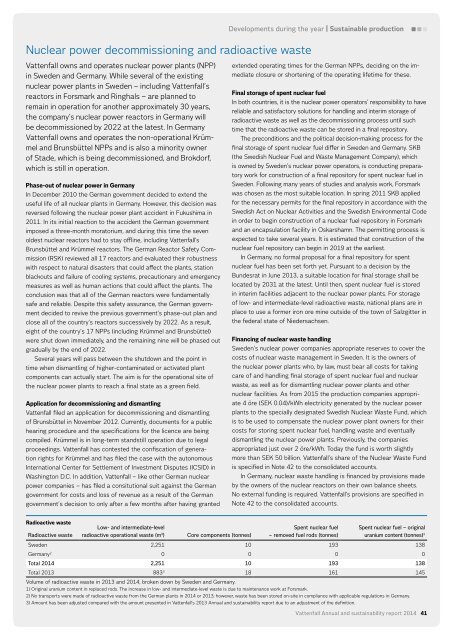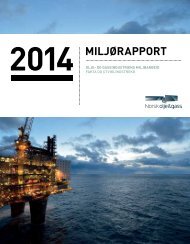annual-and-sustainability-report-2014
annual-and-sustainability-report-2014
annual-and-sustainability-report-2014
Create successful ePaper yourself
Turn your PDF publications into a flip-book with our unique Google optimized e-Paper software.
Nuclear power decommissioning <strong>and</strong> radioactive wasteDevelopments during the year | Sustainable productionVattenfall owns <strong>and</strong> operates nuclear power plants (NPP)in Sweden <strong>and</strong> Germany. While several of the existingnuclear power plants in Sweden – including Vattenfall’sreactors in Forsmark <strong>and</strong> Ringhals – are planned toremain in operation for another approximately 30 years,the company’s nuclear power reactors in Germany willbe decommissioned by 2022 at the latest. In GermanyVattenfall owns <strong>and</strong> operates the non-operational Krümmel<strong>and</strong> Brunsbüttel NPPs <strong>and</strong> is also a minority ownerof Stade, which is being decommissioned, <strong>and</strong> Brokdorf,which is still in operation.Phase-out of nuclear power in GermanyIn December 2010 the German government decided to extend theuseful life of all nuclear plants in Germany. However, this decision wasreversed following the nuclear power plant accident in Fukushima in2011. In its initial reaction to the accident the German governmentimposed a three-month moratorium, <strong>and</strong> during this time the sevenoldest nuclear reactors had to stay offline, including Vattenfall’sBrunsbüttel <strong>and</strong> Krümmel reactors. The German Reactor Safety Commission(RSK) reviewed all 17 reactors <strong>and</strong> evaluated their robustnesswith respect to natural disasters that could affect the plants, stationblackouts <strong>and</strong> failure of cooling systems, precautionary <strong>and</strong> emergencymeasures as well as human actions that could affect the plants. Theconclusion was that all of the German reactors were fundamentallysafe <strong>and</strong> reliable. Despite this safety assurance, the German governmentdecided to revive the previous government’s phase-out plan <strong>and</strong>close all of the country’s reactors successively by 2022. As a result,eight of the country’s 17 NPPs (including Krümmel <strong>and</strong> Brunsbüttel)were shut down immediately, <strong>and</strong> the remaining nine will be phased outgradually by the end of 2022.Several years will pass between the shutdown <strong>and</strong> the point intime when dismantling of higher-contaminated or activated plantcomponents can actually start. The aim is for the operational site ofthe nuclear power plants to reach a final state as a green field.Application for decommissioning <strong>and</strong> dismantlingVattenfall filed an application for decommissioning <strong>and</strong> dismantlingof Brunsbüttel in November 2012. Currently, documents for a publichearing procedure <strong>and</strong> the specifications for the licence are beingcompiled. Krümmel is in long-term st<strong>and</strong>still operation due to legalproceedings. Vattenfall has contested the confiscation of generationrights for Krümmel <strong>and</strong> has filed the case with the autonomousInternational Center for Settlement of Investment Disputes (ICSID) inWashington D.C. In addition, Vattenfall – like other German nuclearpower companies – has filed a consitutional suit against the Germangovernment for costs <strong>and</strong> loss of revenue as a result of the Germangovernment’s decision to only after a few months after having grantedextended operating times for the German NPPs, deciding on the immediateclosure or shortening of the operating lifetime for these.Final storage of spent nuclear fuelIn both countries, it is the nuclear power operators’ responsibility to havereliable <strong>and</strong> satisfactory solutions for h<strong>and</strong>ling <strong>and</strong> interim storage ofradioactive waste as well as the decommissioning process until suchtime that the radioactive waste can be stored in a final repository.The preconditions <strong>and</strong> the political decision-making process for thefinal storage of spent nuclear fuel differ in Sweden <strong>and</strong> Germany. SKB(the Swedish Nuclear Fuel <strong>and</strong> Waste Management Company), whichis owned by Sweden’s nuclear power operators, is conducting preparatorywork for construction of a final repository for spent nuclear fuel inSweden. Following many years of studies <strong>and</strong> analysis work, Forsmarkwas chosen as the most suitable location. In spring 2011 SKB appliedfor the necessary permits for the final repository in accordance with theSwedish Act on Nuclear Activities <strong>and</strong> the Swedish Environmental Codein order to begin construction of a nuclear fuel repository in Forsmark<strong>and</strong> an encapsulation facility in Oskarshamn. The permitting process isexpected to take several years. It is estimated that construction of thenuclear fuel repository can begin in 2019 at the earliest.In Germany, no formal proposal for a final repository for spentnuclear fuel has been set forth yet. Pursuant to a decision by theBundesrat in June 2013, a suitable location for final storage shall belocated by 2031 at the latest. Until then, spent nuclear fuel is storedin interim facilities adjacent to the nuclear power plants. For storageof low- <strong>and</strong> intermediate-level radioactive waste, national plans are inplace to use a former iron ore mine outside of the town of Salzgitter inthe federal state of Niedersachsen.Financing of nuclear waste h<strong>and</strong>lingSweden’s nuclear power companies appropriate reserves to cover thecosts of nuclear waste management in Sweden. It is the owners ofthe nuclear power plants who, by law, must bear all costs for takingcare of <strong>and</strong> h<strong>and</strong>ling final storage of spent nuclear fuel <strong>and</strong> nuclearwaste, as well as for dismantling nuclear power plants <strong>and</strong> othernuclear facilities. As from 2015 the production companies appropriate4 öre (SEK 0.04)/kWh electricity generated by the nuclear powerplants to the specially designated Swedish Nuclear Waste Fund, whichis to be used to compensate the nuclear power plant owners for theircosts for storing spent nuclear fuel, h<strong>and</strong>ling waste <strong>and</strong> eventuallydismantling the nuclear power plants. Previously, the companiesappropriated just over 2 öre/kWh. Today the fund is worth slightlymore than SEK 50 billion. Vattenfall’s share of the Nuclear Waste Fundis specified in Note 42 to the consolidated accounts.In Germany, nuclear waste h<strong>and</strong>ling is financed by provisions madeby the owners of the nuclear reactors on their own balance sheets.No external funding is required. Vattenfall’s provisions are specified inNote 42 to the consolidated accounts.Radioactive wasteRadioactive wasteLow- <strong>and</strong> intermediate-levelradioactive operational waste (m 3 )Core components (tonnes)Spent nuclear fuel– removed fuel rods (tonnes)Spent nuclear fuel – originaluranium content (tonnes) 1Sweden 2,251 10 193 138Germany 2 0 0 0 0Total <strong>2014</strong> 2,251 10 193 138Total 2013 883 3 18 161 145Volume of radioactive waste in 2013 <strong>and</strong> <strong>2014</strong>, broken down by Sweden <strong>and</strong> Germany.1) Original uranium content in replaced rods. The increase in low- <strong>and</strong> intermediate-level waste is due to maintenance work at Forsmark.2) No transports were made of radioactive waste from the German plants in <strong>2014</strong> or 2013; however, waste has been stored on-site in compliance with applicable regulations in Germany.3) Amount has been adjusted compared with the amount presented in Vattenfall’s 2013 Annual <strong>and</strong> <strong>sustainability</strong> <strong>report</strong> due to an adjustment of the definition.Vattenfall Annual <strong>and</strong> <strong>sustainability</strong> <strong>report</strong> <strong>2014</strong> 41



